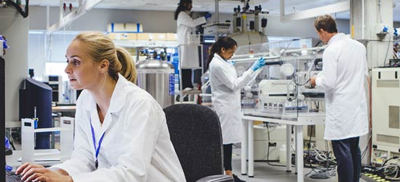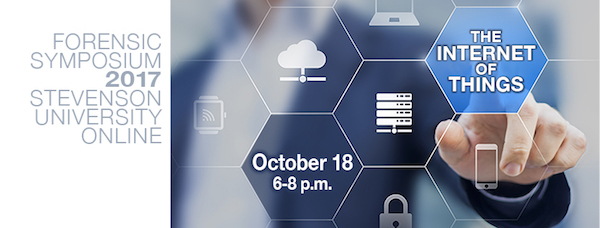October is National Cyber Security Awareness Month which is an annual campaign to raise awareness about the importance of cyber security. In recognition of the campaign, Stevenson University Online is hosting the Internet of Things (IoT), which will illustrate and explore cyber security principles. Stevenson’s Forensic Symposium will delve deep into the trends and topics that pose the most serious threats to consumer privacy via various IoT platforms and devices. There will be demonstrations of consumer electronic IoT devices in order to afford attendees an immersive firsthand experience. In addition to demonstrations, speakers will be in attendance to highlight innovative approaches for organizations and individuals to protect themselves from arising security risks regarding IoT devices. The ongoing digital transformation is ushering several new avenues to integrate devices into multiple aspects of life, such as smart televisions and wearable technology.
Experts in the forensics field have been invited to speak at the Forensic Symposium. The following are their expert opinions on the phenomenon of IoT.
Thomas N. Byrd, J.D.
IoT foundationally is a business-to-consumer technology that brings the Internet into the physical world via various types of consumer products. Examples of IoT devices are Smart TVs with integrated Internet and Interactive Web functionality; Digital Assistants (Google Home and Amazon Echo); Vehicle and Infotainment Systems Forensics; and Smart Refrigerators that promote Food Management, Family Connection and Entertainment through a common computing and networked infrastructure.
There is a need to explore ways of forensically acquiring data from consumer IoT devices and their associated internal systems (Sensors, Memory, Storage) and external systems ( Internet, remote data centers(AI), cloud and remote servers) to aid in law enforcement and intelligence investigations. Many questions need to be addressed and explored. Where is the data generated? In what format? How can the investigator access the data? Which digital forensic principles yield the best acquisition results on IoT devices? How should investigators to analyze IoT data sources such as Analytics, Data service, business systems or other IoT products to glean the most investigative value? important common themes for the business- to-consumer methodology are the business value proposition, which suggests that the devices have interconnectivity features (smartphone to refrigerator to other IoT devices) and that the devices are always on, that they are continually collecting data from sensors and transforming it into useful data analytics as prescribed. The business value proposition gives insight into the past, present and future predictive analysis as defined by the business model.
Peter Evens
IoT has become an integral part of our everyday interactions. From cell phones and watches to microwaves and cars. All of these devices were originally created to assist us in our daily lives with a singular purpose in mind. Over time they have morphed into a more all-encompassing internet connected technology. But, as with most consumer products, security falls to the wayside in the drive for getting a product on the shelves. This will be an open discussion with real life examples of these security shortcomings.
Click here for the full bios of the Forensic Symposium speakers and to register for the event tomorrow, Wednesday, October 18, 2017 from 6 – 8 p.m. on the Owings Mills campus.






